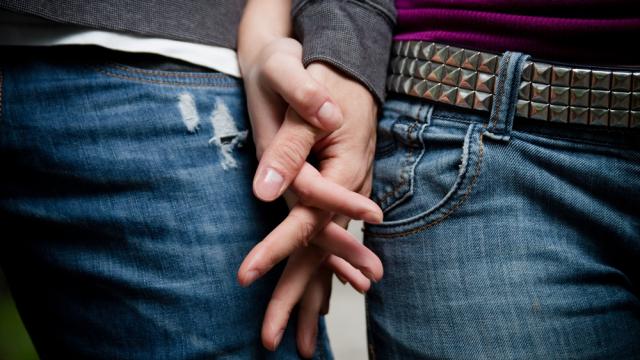The saying “opposites attract” is a little too simple for my liking when it comes to relationships, but if two new studies are any indication, there might be some science behind that theory. Researchers at Charles University in the Czech Republic published a paper last month in Frontiers in Psychology that proposes single people are more attracted to people who look less like them, compared to those in relationships.
Image: Shutterstock
In the first study, 91 women and 29 men between the ages of 21 and 31 were shows a series of photographs of men and women, asked to choose which photos they preferred and to rate how attractive they found those faces. They were also asked to rate the trustworthiness of the people in the photographs with regards to short-term and long-term relationships. In the second study, a similar group was asked to judge how “sexy” or “nice” men and women featured in another set of photos.
The kicker? Those photos were digitally manipulated to look more or less similar to the participants themselves — all of whom were asked to provide photographs of themselves before the survey. Those participants who were single consistently rated dissimilar faces as more attractive, in contrast to those who were in relationships, who preferred the more similar faces in the photographs.
According to the Czech researchers, this lends credence to the theory that we’re attracted to people who look less like us as an instinctual way to avoid inbreeding and promote genetic diversity. But people in long-term relationships tend to care less about similarity than they do the potential for things like kinship.
“This might be a relationship maintenance strategy to prevent us from finding alternatives to our own partner, or perhaps self-resemblance becomes more important in terms of the social support we expect to receive from relatives, which are known as kinship cues,” Jitka Lindová, who led the study, said in a statement.
Besides evolution, another possible reason this might occur, according to researchers, is testosterone, which is lower in men who are in relationships versus men who aren’t (this could apply to women too, but there isn’t a lot of data to back that up).
This study does have its limits, however. It’s a small and relatively young sample size. Also, the study also doesn’t take into account people with homosexual or other non-traditional tendencies. Participants who were attracted to someone of the same sex were asked how they would rate attractiveness based on what a member of the opposite sex would find appealing. And I’m not sure that “sexy” and “nice” would necessarily be considered opposing attributes. (Can’t you be both?) But maybe that’s related to subjective definitions of the words.
